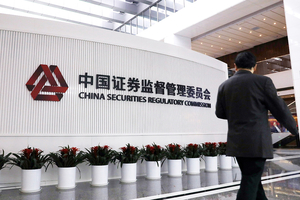China Rolls Out Stricter Rules for Quant Trading to Curb Market Volatility
Listen to the full version

China’s top securities regulator has released new regulations to curb risks associated with program trading, which includes quantitative trading — a controversial practice that has been blamed for triggering stock market turmoil.
The China Securities Regulatory Commission (CSRC) published the final rules on program trading on Wednesday. They will take effect on Oct. 8.

Download our app to receive breaking news alerts and read the news on the go.
Get our weekly free Must-Read newsletter.
- DIGEST HUB
- New regulations by China's CSRC to curb risks in program trading will take effect on Oct. 8.
- Quantitative traders must report relevant details before trading, and exchanges should monitor trades in real-time to identify abnormalities.
- Quant traders, constituting 5% of A-share market holdings but 29% of its trading value, have raised concerns over market volatility.
China’s top securities regulator, the China Securities Regulatory Commission (CSRC), has released new regulations to mitigate the risks involved with program trading, which includes quantitative trading, a practice often blamed for causing stock market upheavals [para. 1].
These final rules on program trading were published on Wednesday and are set to take effect on October 8 [para. 2]. Under the new regulations, stock exchanges and securities firms are mandated to ensure a level trading environment for various traders. Exchanges must monitor program trading in real-time and establish standards to identify "abnormal trades." This is designed to prevent securities firms from giving preferential treatment to program traders, and to enhance monitoring to curtail risks [para. 3]. Program traders must disclose their information — such as their accounts, funds, software, and trade settings — before executing trades [para. 4].
The heightened scrutiny of quant traders stems from their perceived role in exacerbating market volatility, especially given the prolonged fluctuations in the country’s capital markets [para. 5]. Quant traders use algorithms and mathematical models to execute large-scale transactions in under a second, a method called high-frequency trading [para. 6]. The State Council's guidelines on promoting high-quality development of the capital markets, published in April, call for stronger oversight on high-frequency trading through the introduction of program trading rules [para. 7].
A draft of these regulations was released for public consultation on April 12, roughly two months after the Shanghai and Shenzhen stock exchanges penalized a prominent quant fund manager for allegedly causing abrupt dips in their benchmark indexes [para. 8]. The CSRC has pledged to collaborate with exchanges and industry associations to further detail the implementation of the new rules, incorporating insights from global markets and feedback from domestic market participants [para. 9].
These regulations are anticipated to have a significant impact on the market. Although quant traders’ stock holdings represent around 5% of the total value of shares circulating in China’s A-share market, they contribute approximately 29% to the market's total trading value, according to Zhang Wangjun, a CSRC official, during an April briefing [para. 10]. Insider sources also disclosed that more than 90% of program trading accounts are managed by private investment fund managers [para. 11].
To discuss this further, contact reporter Zhang Yukun at yukunzhang@caixin.com and editor Jonathan Breen at jonathanbreen@caixin.com [para. 12].
- PODCAST
- MOST POPULAR






